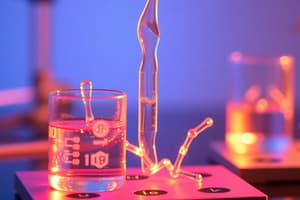Podcast
Questions and Answers
What is the main difference between strong and weak electrolytes?
What is the main difference between strong and weak electrolytes?
- Strong electrolytes conduct electricity, weak electrolytes do not
- Strong electrolytes increase conductivity with temperature, weak electrolytes decrease conductivity
- Strong electrolytes completely dissociate in solution, weak electrolytes have less than 100% dissociation (correct)
- Strong electrolytes are metals, weak electrolytes are semiconductors
How do metallic conductors and electrolytic conductors differ in conducting current?
How do metallic conductors and electrolytic conductors differ in conducting current?
- Metallic conductors are semiconductors, while electrolytic conductors are metals
- Metallic conductors increase conductivity with temperature, while electrolytic conductors don't
- Metallic conductors have less conductivity than electrolytic conductors
- Metallic conductors conduct current through the flow of electrons; electrolytic conductors do so through the flow of ions (correct)
In which conditions does the conductivity of metallic conductors decrease?
In which conditions does the conductivity of metallic conductors decrease?
- With decreasing temperature due to ion movement
- With decreasing temperature due to electron loss
- With increasing temperature due to increasing electron scattering (correct)
- With increasing temperature due to ion scattering
What is the role of the nature of the electrolyte and solvent on the conductivity of electrolytic conductors?
What is the role of the nature of the electrolyte and solvent on the conductivity of electrolytic conductors?
What is converted into electrical energy in electrochemical cells?
What is converted into electrical energy in electrochemical cells?
What does electrode potential refer to?
What does electrode potential refer to?
Which type of conductors conduct current due to the flow of ions?
Which type of conductors conduct current due to the flow of ions?
What happens to the conductivity of metallic conductors with increasing temperature?
What happens to the conductivity of metallic conductors with increasing temperature?
How do strong electrolytes differ from weak electrolytes in a solution?
How do strong electrolytes differ from weak electrolytes in a solution?
What is the main role of electrochemical cells?
What is the main role of electrochemical cells?
Why do shortcuts like 'loan' and 'panic' help in remembering processes in electrochemical and electrolytic cells?
Why do shortcuts like 'loan' and 'panic' help in remembering processes in electrochemical and electrolytic cells?
In non-standard conditions, what is electrode potential a measure of?
In non-standard conditions, what is electrode potential a measure of?
Flashcards are hidden until you start studying
Study Notes
- The video is a 30-minute revision on electrochemistry, an important and scoring chapter.
- It covers concepts like electrolytes, conductors, and cells in electrochemical and electrolytic cells.
- Strong electrolytes completely dissociate in solution, while weak electrolytes have less than 100% dissociation.
- Conductors can be classified into metals, electrolytes, and semiconductors based on their ability to conduct electricity.
- Metallic conductors conduct current due to the flow of electrons, while electrolytic conductors do so due to the flow of ions.
- The conductivity of metallic conductors decreases with increasing temperature due to increasing electron scattering.
- Nature of the electrolyte and solvent affect the conductivity of electrolytic conductors.
- Electrochemical cells convert chemical energy into electrical energy, while electrolytic cells convert electrical energy into chemical energy.
- Shortcuts like "loan" and "panic" can help remember the processes in electrochemical and electrolytic cells.
- Electrode potential refers to the ability of an electrode to gain or lose electrons, measured in non-standard conditions.
Studying That Suits You
Use AI to generate personalized quizzes and flashcards to suit your learning preferences.




